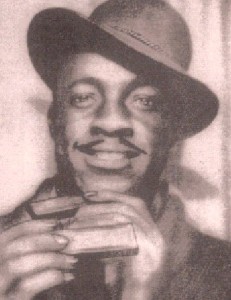Born John Lee Williamson in Jackson, Tennessee. One of the founding members of the post-War Chicago blues scene, Sonny Boy Williamson did more to popularize the harmonica than any of his contemporaries. His musical and geographical migration from the deep South up the Mississippi to Chicago exemplifies his rise in popularity. Williamson never realized his full potential as a musician, as he was tragically murdered at the peak of his career.
He taught himself to play harmonica as a teenager and by his late teens was touring the Depression-era South, playing with the likes of Big Joe Williams and Robert Nighthawk. With his masterful harp (harmonica) playing and country-blues sound, Williamson fused a new band format with the harmonica as lead instrument.
With Sonny Boy leading on the harp and vocals, Big Joe Williams played a rough-sounding nine string lead guitar. Along with his exact, clear harp sound, Williamson was known for his unique vocals. Although he suffered from a speech impediment which caused his speech to slur, Sonny Boy adapted his singing style to accommodate his handicap. This gave Williamson’s singing an alluring, bluesy feel, which was impossible to replicate.
In 1937 Williamson moved to Chicago, where he quickly established himself as an elite harp player, and his harmonica-led group format soon became the norm. It was not long before Williamson signed on with the Bluebird label, where he played and recorded with many blues greats, including Big Bill Broonzy, and wrote and recorded some of his greatest songs, such as ?Hoodoo, Hoodoo,? which was to be adapted later by another harp-master, Junior Wells, and ?Good Morning Little School Girl,? a blues classic that has been covered by many bands, such as The Yardbirds and The Grateful Dead.
Sonny Boy Williamson was murdered with an ice pick while returning home from a gig in the South Side of Chicago in 1948, during the height of his career. He was inducted into the Blues Foundation Hall of Fame in 1980. His albums include Sonny Boy Williamson, Volumes 1-5 and Throw a Boogie-Woogie (with Big Joe Williams).
Died: 6/1/1948
